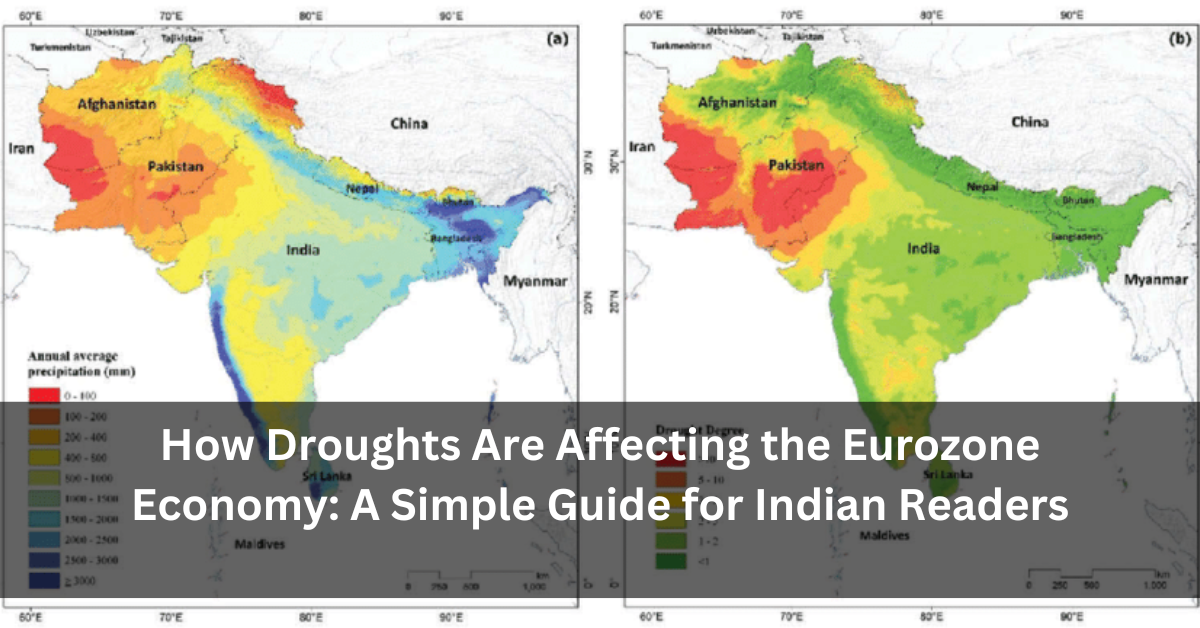How Droughts Are Affecting the Eurozone Economy: A Simple Guide for Indian Readers
Drought is no longer just a weather issue. In the Eurozone—home to countries like Germany, France, Spain, and Italy—droughts are starting to cause serious economic trouble. From crops and transport to energy and banking, the impact is spreading fast.
In this blog from Blogs, we’ll break it all down in simple terms. We’ll explain how less rainfall is making big problems for businesses and why it matters even to people living in India.
What Is the Eurozone and Why Are Droughts a Problem?
The Eurozone is a group of European countries that use the euro as their currency. These countries are a big part of the global economy. But now, they are facing one of the biggest challenges—long and intense droughts.
According to the European Central Bank (ECB), these water shortages could cut down the region’s total output by nearly 15%. This means jobs, business, and public services could all suffer.
Farming Is Taking a Big Hit
How Drought Affects Agriculture
Farming depends heavily on water. When there is not enough rain, crops dry out and fail. Countries like Spain and Italy, which grow vegetables, fruits, and wine, are seeing big losses.
The European Union recently said that extreme weather is costing their farmers around €28 billion every year. Droughts are responsible for over half of that amount.
What This Means for Everyone
When farms don’t produce enough, prices of food items can go up. That doesn’t just affect Europe. Since many countries trade food globally, prices in Indian markets could also rise, especially for imported items.
To follow such important updates, visit Blogs regularly.
Factories and Transport Are Also Suffering
Low River Levels Stop Goods from Moving
In Europe, rivers are often used to move goods. One important river is the Rhine, which passes through Germany. During droughts, river levels fall so low that large ships can’t travel. This delays deliveries, increases transport costs, and slows down business.
Impact on Energy Production
Many European countries use hydropower, which needs water to generate electricity. When rivers dry up, power generation drops. That means energy becomes more expensive for factories and homes.
Why Financial Institutions Are Worried
It’s not just farms and factories that are affected. Banks in the Eurozone have given out loans worth €1.3 trillion to businesses in sectors like agriculture, mining, construction, and manufacturing. These are the sectors directly affected by drought.
When these businesses struggle, they may fail to repay their loans. This could weaken the banking system and create larger financial problems.
Stay informed about such financial issues at Blogs.
What the Government Plans to Do?
Support for Farmers
The European Union is not sitting idle. They are planning to give more support to farmers through the Common Agricultural Policy. Some of the steps being proposed include:
- Using drought-tolerant crops
- Improving irrigation systems
- Teaching better ways to manage water on farms
These methods aim to reduce water waste and help farmers manage future droughts better.
Why Does This Matters to India Too?
Trade and Price Effects
India buys and sells goods with many countries in the Eurozone. If production in those countries goes down, global supply chains are affected. This can lead to:
- Increase in prices of food and imported goods
- Delays in delivery of goods
- Less demand for Indian exports due to weaker economies
Even if you don’t directly work in global trade, you may still feel the effects in your daily shopping bills.
A Warning Sign for Other Countries
If rich and developed regions like the Eurozone can face this kind of crisis, then countries like India, which already face water problems, need to pay even more attention. This is a reminder to take water management seriously—both in cities and villages.
To keep track of how global changes affect local life, check Blogs.
Conclusion
Drought is not just about dry soil and hot weather. In the Eurozone, it is causing trouble for farmers, slowing down industries, raising electricity costs, and even shaking banks. It’s an issue that’s spreading across different parts of the economy.
For India and the rest of the world, this is more than just foreign news. It’s a sign that we need to understand and prepare for the ways in which weather can affect money, jobs, and everyday life.
For more such easy-to-understand blogs on world business, finance, and climate, keep reading Blogs.







